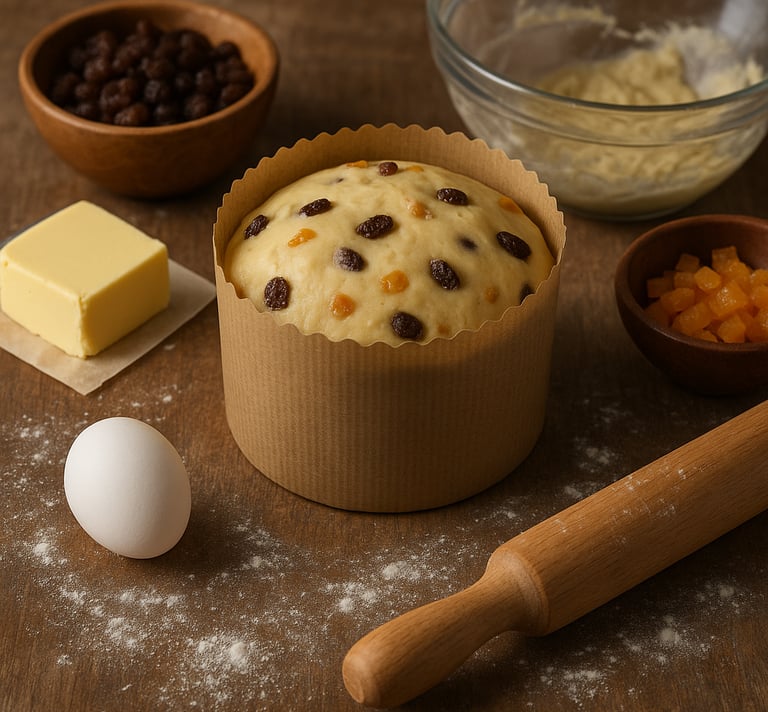Panettone: The Golden Crown of Italian Christmas
As a former aid worker who wandered through Milan's festive markets, I was captivated by panettone's towering beauty and ethereal texture. This isn't just bread—it's edible poetry that transforms simple ingredients into Christmas magic through patience and love.
KITCHEN FLAVORS
Wandering Armenian
9/2/20253 min read


Panettone: The Golden Crown of Italian Christmas
Traditional Italian Panettone (Milan's Christmas Crown)
History of the Cuisine
Panettone emerged in 15th-century Milan as a symbol of Renaissance prosperity and craftsmanship. Originally created for the wealthy Milanese nobility, this towering, sweet bread represented abundance during harsh winters. The name derives from "panetto" (small loaf) transformed to "panettone" (large bread), reflecting its evolution from humble beginnings to grand celebration.
During the Renaissance, Italian bakers elevated bread-making to an art form. Panettone became the centrepiece of Christmas tables, symbolizing hope, renewal, and the promise of sweetness after darkness. Its labour-intensive process—requiring multiple proofs over days—embodied the Italian philosophy that the most precious things in life require patience and dedication.
The bread's distinctive dome shape was said to represent the cupolas of Milan's great churches, making it both a culinary and spiritual offering during the most sacred season.
Ingredients
For the Dough and Sponge:
5 cups (600g) all-purpose flour, divided, plus extra as needed
1 tablespoon instant yeast
2/3 cup warm water
5 large eggs
Finely grated zest from 1 orange
1/3 cup (68g) sugar
2 teaspoons vanilla extract
1 1/2 teaspoons fine sea salt
12 tablespoons (170g) unsalted butter, room temperature
1 tablespoon (14g) cold unsalted butter for topping
Vegetable oil spray
For the Fruit and Nuts:
1/2 cup dark raisins
1/2 cup golden raisins
1/2 cup high-quality candied orange peel
1/4 cup dark rum
1/4 cup hot water
1/2 cup slivered almonds (optional)
For the Topping:
2 tablespoons slivered almonds
1 tablespoon caster sugar
1 egg white
Special Equipment:
Stand mixer
7x4-inch panettone mould or 10x2-inch cake pan
Kitchen string
Parchment paper
Preparation Process
Day 1: Creating the Foundation
Prepare the sponge: Combine warm water, yeast, and 1 teaspoon sugar. Let bloom for 5 minutes until frothy.
Make the base dough: In a stand mixer, cream remaining sugar, butter, and vanilla until pale and fluffy (8-10 minutes). Add orange zest, then eggs one at a time.
Form the dough: Combine flour and salt in a large bowl. Create a well, add yeast mixture and butter mixture. Mix until a soft, sticky dough forms.
First knead: Knead in bowl for 5 minutes, then turn onto floured surface. Knead for 10 minutes until smooth and elastic, adding minimal flour to prevent sticking.
First rise: Place in greased bowl, cover, refrigerate overnight (12-24 hours).
Day 2: The Transformation
Prepare fruit: Gently heat raisins with rum for 5-7 minutes until plump. Cool completely.
Second knead: Remove dough from fridge, knead 5 minutes. Gradually incorporate soaked fruit and candied peel.
Shape and second rise: Form into ball, place in prepared mold. If using cake pan, wrap parchment paper around outside, extending 2 inches above rim, secure with string. Cover, rise 3-4 hours until doubled.
Final preparation: Preheat oven to 350°F (180°C). Mix almonds, sugar, and egg white for topping. Brush over risen dough.
Bake: 40-50 minutes until golden and skewer comes out clean. Cool in pan 10 minutes, then transfer to wire rack.
Nutrition Content (Per Serving - Makes 12 servings)
Calories: 380
Protein: 8g
Carbohydrates: 58g
Fat: 14g
Fiber: 2g
Sugar: 18g
Sodium: 280mg
Rich in B vitamins from enriched flour and eggs, with antioxidants from citrus zest and dried fruits.
Pro Variation Tips
Flavor Variations:
Replace rum with amaretto for almond notes
Add 2 tablespoons limoncello for extra citrus brightness
Incorporate chocolate chips for "panettone al chocolate"
Texture Enhancements:
Brush with simple syrup while warm for extra moisture
Add 1 tablespoon honey to dough for deeper sweetness
Include toasted pine nuts with almonds
Make-Ahead Strategy:
Freeze shaped, unbaked loaf up to 1 month
Store baked panettone wrapped in cheesecloth with apple slices.
Troubleshooting:
If dough tears during kneading, rest 20 minutes and continue
For extra height, use a collar made from parchment paper
Ensure room temperature is 75-78°F for optimal rising
Concluding Thoughts
Like the communities I served worldwide, panettone teaches us that beauty emerges through patient tending. Each rise mirrors life's seasons—sometimes we wait in darkness before ascending to light. "She rises while it is yet night." - Proverbs 31:15

